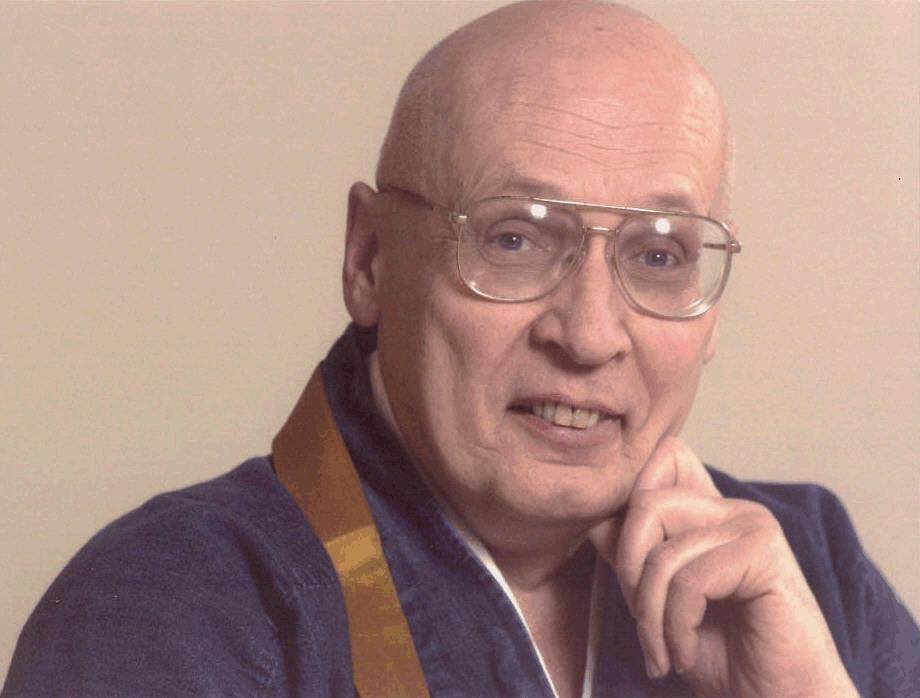Nonin Chowaney
Dharma heir of Dainin Katagiri, abbot of the Nebraska Zen Center, founded by Katagiri in 1975, until 2016.
RIP Nonin who died July 29, 2022.
Posted on What's New: Dear friend. We haven't been in touch for so long. I was just thinking of calling you but we'll have to communicate through other means now. Gya te gya te! - dc
Some neat photos with Nonin on the
History Page of the
Nebraska ZC
Nonin's Facebook page - many heartfelt notes on his passing
Sweeping Zen interview with Nonin
Visting the Temple from Sweeping Zen
Cuke Audio Memorial Podcast on Nonin 🔊
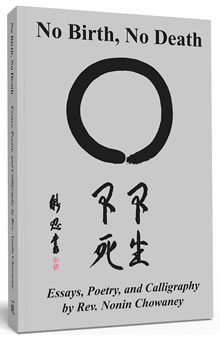 No Birth, No Death is a collection of essays, poetry, and calligraphy by Rev. Nonin Chowaney, former abbot of the Nebraska Zen Center. - edited by Tessho Michael D’Elia - Publisher's website
No Birth, No Death is a collection of essays, poetry, and calligraphy by Rev. Nonin Chowaney, former abbot of the Nebraska Zen Center. - edited by Tessho Michael D’Elia - Publisher's website
Sample pages
Back cover
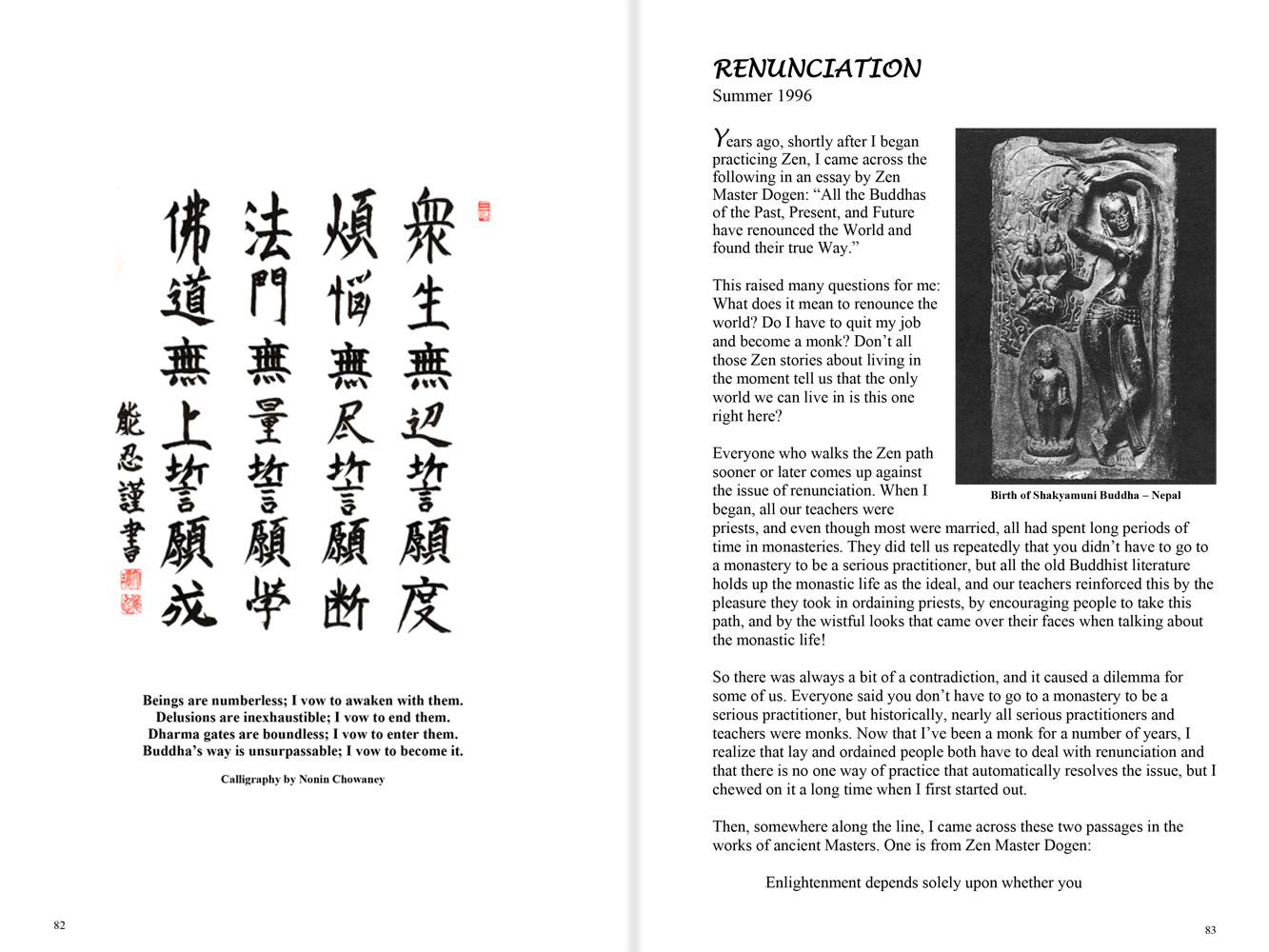
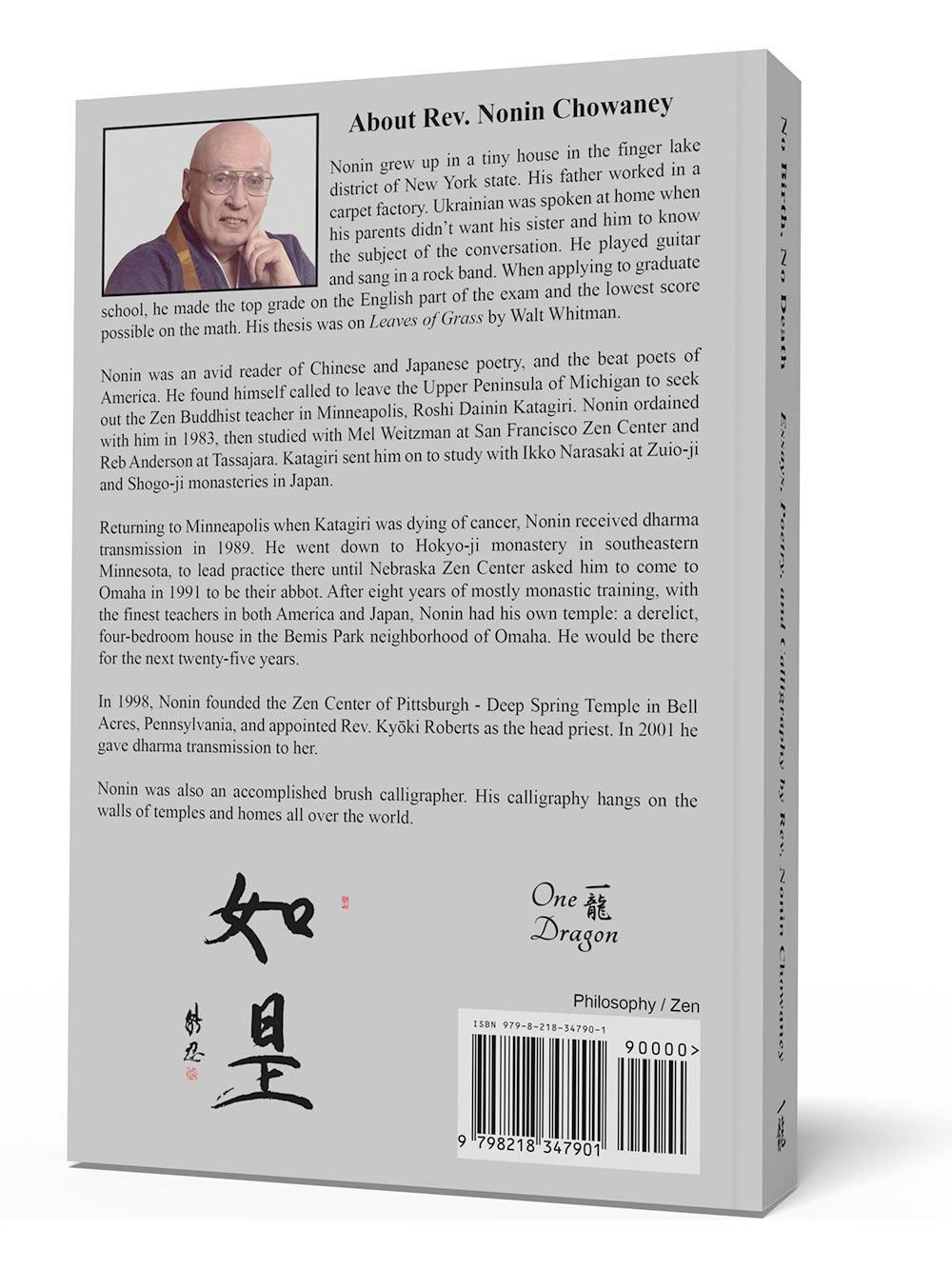
Two Poems by Nonin
What is Ryaku Fusatsu by Nonin
Three pieces by Nonin from the Chaple Hill ZC site - Santoka Taneda, Ryokan, Putting Down Our Burden
Nonin is a major character in Thank You and OK!: an American Zen Failure in Japan in which he's called Norman. That name occurs 401 times in the book. One of the focuses of the book is time I spent at a practice temple named Shogoji in Kyushu, Japan (called Hogoji in the book). Nonin was in residence there and there were only six of us so we were close. Katagiri was there too and he's another major character in the book. When it was finished I sent it to Nonin to get his permission to expose his virtues and problems so thoroughly. He wrote back that he read the book twice, cried through the 2nd half both times, made extensive notes, then decided not to send them, that it was all perfect, not to change a word. He remarked he was impressed I could remember so much and said he'd be more careful what he said to me in the future. I write this on the day Nonin died. I am currently going over the recordings for an audiobook of Thank You and OK so Nonin has been on my mind quite a bit. I was just thinking of calling him. Farewell dear friend. - dc
Nonin is mentioned seven times in the Tassajara 25 year book. There we see he was shuso in the fall of 1986 practice period led by Mel Weitsman and it included an entry he made in the shuso log.
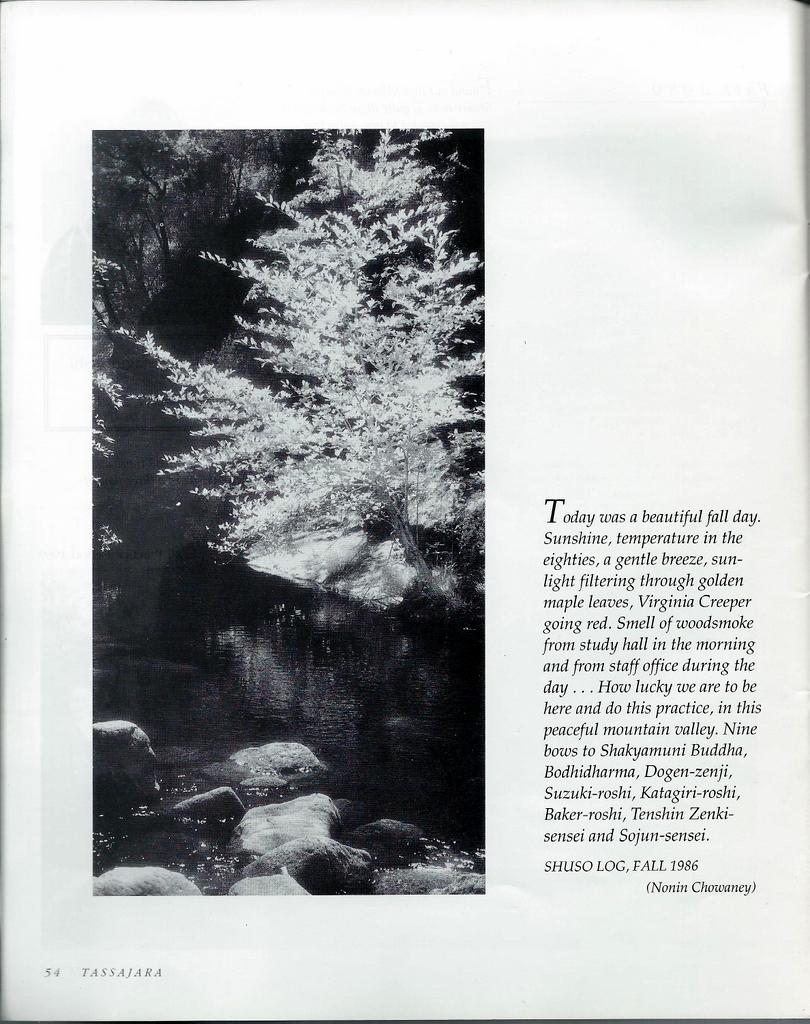
by Nonin Chowaney
At Nebraska Zen Center / Heartland Temple, we perform
an ancient chanting and bowing ceremony called Ryaku Fusatsu (Jap.) once a
month. We also refer to this ceremony as our Precept Ceremony, for in it we
re-affirm our commitments to live according to the Sixteen Bodhisattva
Precepts, our Ethical Guidelines for everyday life. I'd like to explain what
this ceremony is and how we perform it here.
Ryaku Fusatsu is indeed ancient. Its roots go back to
Pre-Buddhist India, to ancient Vedic lunar sacrifices performed on the
nights of the new and full moon. By Shakyamuni Buddha's time 2600 years ago,
these sacrifices were no longer performed, but the new and full moon
occurrences were still observed by Hindus as holy days of purification and
fasting, days when the Gods came to dwell in the house. They became known as
Upavastha (from the Sanskrit upa, near and vas, dwell).
Legend has it that Shakyamuni Buddha's followers also
gathered on those days, perhaps because they didn't want to be left out.
They would sit down and meditate together. Later, lay disciples in whose
homes the monks and nuns would sometimes gather – wanted some teaching, so
the monks began to recite the 227 rules of the Patimokkha discipline, the
rules governing everyday conduct for monks and nuns (257 for nuns). This
recitation developed into a confession and repentance ceremony, during which
the monks and nuns would speak up if they had violated any of the rules and
vow to do better in the future.
This ceremony is still performed today, at the same
time and in the ancient way, by Theravadin monks and is called Uposatha in
the Pali language, a variation of the old Upavastha, the, "near-dwelling" of
the Gods on the ancient Hindu holy days. In Mahayana Buddhism, the spirit of
the ceremony is preserved, but the 227 rules are not recited, because
Mahayana sects have abandoned them. Instead of the confession being made to
other monks, it is made directly to Buddha.
The ceremony was transmitted, with lots of changes and
developments, from India through China to Japan and now has been transmitted
to America as Ryaku Fusatsu, as it is known in Soto Zen Buddhism.
"Ryaku" means, "abbreviated," or "simple." This
distinguishes the ceremony from a "full fusatsu," a complicated, elaborate
event still performed in Japan once or twice a year in some large temples.
It takes two to three hours to complete. The simple ceremony we do here
takes about forty-five minutes. "Fusatsu" means, "to continue good
practice," or, "to stop unwholesome action (karma)." The name conveys the
spirit of repentance and confession present in the Theravadin Uposatha
Ceremony. Ryaku Fusatsu today, as performed in Soto Zen temples, includes
the reading/transmission of Buddha's precepts, lots of bowing, and some of
the elaborate, beautiful chanting common to Soto Zen Buddhism in Japan but
rarely heard in America.
The ceremony has a series of parts. It begins with an
incense offering to all Buddhas throughout space and time. We then chant the
Formless Repentance: "All my past and harmful karma, Born from beginningless
greed hate and delusion, through body, speech, and mind, I now fully avow.”
After our repentance, we invoke the presence of all Buddhas, Bodhisattvas,
and Ancestors and call up their wisdom and compassion by chanting the names
of a series of representatives, Shakyamuni Buddha, Maitreya Buddha, Manjusri
Bodhisattva, Zen Master Dogen, and others. Then, we chant the Four
Bodhisattva Vows: "Beings are numberless; I vow to free them, Delusions are
inexhaustible; I vow to end them, Dharma gates are boundless; I vow to enter
them, Buddha's way is unsurpassable; I vow to realize it."
After the Four Vows, the Ino (chanting leader) receives
Wisdom Water from the Doshi (service leader) and purifies the room by
sprinkling it around the perimeter. Then, the Doshi, acting as Preceptor,
reads Zen Master Dogen's "Essay On Receiving and Conferring the Precepts."
In the middle of this reading at Heartland Temple, we have instituted the
practice of taking the Precepts together. The Doshi reads each precept and
asks the sangha if they will “receive and maintain this precept.” The sangha
replies, “Yes, I will” after each one. These are the Sixteen Bodhisattva
Precepts we use during the ceremony:
THREE REFUGES
I take refuge in Buddha
I take refuge in Dharma
I take refuge in Sangha
THREE PURE PRECEPTS
A follower of the Way does no harm.
A follower of the Way does good.
A follower of the Way lives to benefit all beings
TEN PROHIBITORY PRECEPTS
I am reverential and mindful with all life; I am not
violent; I do not willfully kill.
I respect the property of others; I do not steal.
I am conscious and loving in my relationships; I do not misuse sexuality.
I honor honesty and truth; I do not deceive.
I exercise proper care of my body/mind; I am not gluttonous; I do not abuse
drugs
or encourage others to do so.
I recognize that words can hurt others; I do not slander.
I am humble; I do not praise myself or judge others.
I cultivate letting go; I do not attach to anything, even the teaching.
I cultivate inner peace; I do not harbor ill-will.
I esteem the Buddha, Dharma, and Sangha; I do not defame them.
We then take refuge in the Three Treasures by reciting
the following:
I take refuge in Buddha.
May all beings
embody the great Way,
resolving to awaken.
I take refuge in Dharma.
May all beings
deeply enter the sutras,
wisdom like and ocean.
I take refuge in Sangha.
May all beings
support harmony in the community,
free from hindrance.
Ryaku Fusatsu ends with the Doshi reciting an Eko
(merit transfer), which reads, “On this full moon night, we offer the merit
of the Bodhisattva's way throughout every world system to the unconditioned
nature of all being.” The Sangha then chants the closing verse, "All Buddhas,
throughout space and time; all honored one, bodhisattvas, mahasattvas [great
beings]; wisdom beyond wisdom, maha prajna paramita [great perfect wisdom].
Ryaku Fusatsu offers us an opportunity to acknowledge
all past action (karma), to receive the precepts, and to rededicate
ourselves to the practice of the Bodhisattva's Way. We perform this ceremony
at Nebraska Zen Center / Heartland Temple every month, as close to the
evening of the full moon as possible to conform to the ancient tradition.
Nonin Chowaney long time friend , heir of Katagiri Roshi died yesterday , he had been not well for a while. In the last few years he did send me a few of his calligraphy pieces which I cherish even more now. For many years we would meet at AZTA meetings and certainly enjoyed his genuineness. Rest In Peace my friend. - Daniel Terragno
